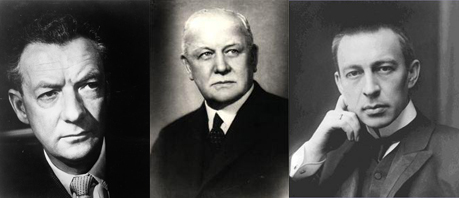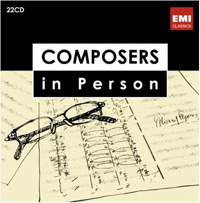
Composers at the Wheel
"You play just like a composer!" Clifford Curzon once sniped to my friend, the composer David Conte. Curzon intended it, and David understood it, as an insult.
My, how the world has changed from the 19th century and before, when to "play like a composer" meant to play like Bach, Beethoven, Mozart, Chopin, Mendelssohn, or Liszt. The role of composer had not separated itself from more overtly public roles such as performer or conductor. Even in the 20th century, Rachmaninoff, Barber, Britten, Bernstein and Bartók ensured that the tradition lived on. In one case -- Bernstein -- the conductor has eclipsed the composer to some degree.
Hearing a composer conduct or play his or her own music typically requires a bit of balancing between the undeniable authority brought to the music against the possibility that the composer's relative lack of skill may very well mask the benefits of that authority. It is also true that a gifted professional performer, being at a slight remove, may bring a perspective towards a composition that would not occur to the composer.
A case in point: Richard Rodgers's lovely song "Isn't It Romantic" from the movie Love Me Tonight. Rodgers insisted on the song being performed up-tempo, almost jauntily -- thus you hear it in the movie. But most singers left to their own sensibility sized up "Isn't It Romantic" as a slow, sexy ballad, and that's the way they sang it. To hear "Isn't It Romantic" sung by Ella Fitzgerald is to realize just how much erotic potential was just waiting there to be released, no matter what its composer thought.
Not to rag unfairly on Rodgers here -- his musical instincts were generally irreproachable -- but I should mention that originally he insisted on a moderately fast tempo for "It Might as Well Be Spring" in the movie State Fair. Others interceded, the song was allowed to be slow-ish and wistful, and Rodgers & Hammerstein won themselves a best-song Oscar.
Whether Igor Stravinsky was the best conductor -- or even a reasonably good one -- for his own music remains a controversial issue. Pierre Boulez, a superbly skilled conductor, downright eviscerated Stravinsky's podium technique. Film of Stravinsky conducting reveals a lack of any distinguishing style, but on the other hand, his beats were nice and clear. Stravinsky's conducting was good enough to sustain him through a heroic recording career ranging from the late 1920s to the late 1960s, so blanket dismissals of him as a baton hack are unfair and misleading. (I have written a series of articles about Stravinsky on record; you may access them here, here, and here.)
Certainly as a pianist Igor Stravinsky was not going to be setting the world on fire. He could get around well enough, as his Serenade en La and Capriccio for Piano and Orchestra attest. However, the 1938 Paris recording of Concerto for Two Solo Pianos with son Soulima reveals both pianists teetering on the far edge of their respective technical abilities; it's just too doggone hard for them.
I would rank Dmitri Shostakovich a significantly better pianist than Stravinsky, judging from the superlative performances he left us of his two piano concertos (with André Cluytens conducting) as well as a number of solo piano pieces, including some of his remarkable preludes & fugues.
Styles also change in time, and thus a composer's own performances may come to seem a bit dated even when the composer's executive ability stands unquestioned. Modern listeners approaching Sergei Rachmaninoff's performances of his own piano music are likely to be surprised by just how much interpretative latitude he took -- often far more than a pianist today would dare.
Consider his performance of the Prelude in G Major, Opus 32 No. 5. To begin with, between measures 2 and 6 one would be hard-pressed to find two beats played in the same tempo. The highest note of the initial phrase is notated on the afterbeat of the 3rd beat of measure 4; Rachmaninoff delays it so much that he actually plays it with the LH notes of the fourth beat instead, introducing a truly whopping, and gloriously effective, ritard into the downbeat of measure 5.
Even more interesting is Rachaninoff's solution to the leggiero ("lightly") marking that introduces the first phrase extension in measures 7 - 8 -- he gooses the tempo dramatically, almost doubling it, in fact. Certainly to play the piece without abundant rhythmic freedom would be to miss the boat dramatically, but most modern pianists don't come anywhere near close to Rachmaninoff's quasi-improvisatory quality. In fact, I can easily imagine some hapless conservatory piano major flunking his jury were he to attempt such a free-wheeling performance.
A composer's own interpretations may exert a powerful gravitational influence on subsequent generations. Edward Elgar's 1926 recording of his Enigma Variations established a fairly flowing tempo for the "Nimrod" movement that has neen generally respected by later conductors -- for example, Toscanini's 1935 version with the BBC Symphony takes a similar tempo, as does John Eliot Gardiner's more recent outing with the Vienna Philharmonic. A conductor who strayed too far from what had become an established orthodoxy -- think Leonard Bernstein with the BBC -- wound up being pilloried in the press. (I find Bernstein's "Nimrod" quite compelling, myself.)
Benjamin Britten stands tall amongst those composers who left an unambiguously world-class recorded legacy behind. Britten had both the conducting and the pianistic chops to deal with the challenges of his music, he had Peter Pears, and he had the British recording industry, particularly Decca, to ensure that it was all put down in first-class sound for posterity. Even under the looming shadow of the Britten legacy, conductors such as Simon Rattle have managed to make a solid mark with their own interpretations nonetheless, so while Britten's influence has been profound it has not been suffocating.
Other composers' interpretations, on the other hand, have been respected more in word than in deed. Bartók's many recorded performances of his piano works reveal a surprising light, even limpid touch, even in generally percussive works such as the Allegro barbaro. Typically, however, pianists have aimed for a much more geometric style of playing, one filled with angularity and space between the notes, despite Bartók's much more...well...romantic style of playing.
Speaking of romantic styles, few idioms are as challenging to modern performers as a Viennese waltz; some overdo the schmaltz and turn it into gooey schtick; others fearing just that possibility take ridiculously fast tempi or determinedly non-sentimental approaches. Neither suffices. But we can hear Franz Léhar himself conducting some of his signature tunes, such as the glorious Eva waltz, or that faded but voluptuous tune "Meine Lippen, Sie Kussen So Heiss" from Giuditta. Here the music flows along gently, never rushed, but also avoiding unnecessary goo. There's a strength about it all, but more than anything a lack of self-consciousness. Having the Vienna Philharmonic before your baton doesn't hurt a bit, needless to say. If you want to absorb proper Viennese gemütlichkeit, Léhar's performances should be amongst your first stops.

Three composer-performers: Benjamin Britten, Franz Léhar, and Sergei Rachmaninoff
Good news for piano students everywhere: George Gershwin, in playing his own Piano Prelude No. 1, slowed down the murderous leap right at the ending. It's marked as a lightning quick thud-whack requiring a left-hand lunge of three octaves in the space of a split second. Lots of folks attempting to respect the actual notation miss the low B-flat and play an inadvertent cluster instead. Not George: he blithely ignored his own notation, took his sweet time getting there, and thwocked that low B-flat bang on. But would you dare do that yourself?
There are those composers who have played and/or conducted their own music but were really better served by others: Aaron Copland comes to mind in that respect, Paul Hindemith ditto. Heitor Villa-Lobos, on the other hand, did at least as well as anyone else and considerably better than most.
Richard Strauss was another composer with a truly stellar conducting career, and in his own music he simply breathes authority. (Not to mention some seriously dandy renditions of other composers as well.) I'm often surprised at the lack of sentimentality in his interpretations -- for example, the orchestral selections from Rosenkavalier are almost matter-of-fact, even in that radiant third act final Trio. His 1941 Munich performance of Eine Alpensinfonie is one of the most direct you are likely to hear -- almost clipped compared to, say, Karajan's opulence or Blomstedt's long-breathed line in his stellar SFO recording.
Francis Poulenc is a prime source for his own vocal and piano works, as are the great French organist-composers such as Widor, Vierne, and Messaien in their respective bailiwicks. On the other hand, Serge Prokofiev's own performance of his Third Piano Concerto, while fascinating for its own sake, ranks very poorly amongst the many stunning renditions from pianists during the past half century.
Fortunately, the tradition of the composer-pianist has not died out, nor has the composer-conductor. Among the former include George Benjamin, whose recording of his own 1980 Piano Sonata represents one of modern pianism's most stunning achievements, and among the latter certainly Oliver Knussen takes a special pride of place.
 If you'd like to explore composers performing their own music, the EMI 22-CD box set "Composers in Person" makes for a great, low-priced sweep across the field and includes the lion's share of the performances I've discussed in this article. Given that it's a collection of mostly EMI recordings, those composers outside EMI's orbit are conspicuously absent -- the Americans in particular. But many of those deficiencies can be made up easily -- recordings by Gershwin, Copland, Bernstein, Hanson, Harris, Barber et al., are fairly easy to find.
If you'd like to explore composers performing their own music, the EMI 22-CD box set "Composers in Person" makes for a great, low-priced sweep across the field and includes the lion's share of the performances I've discussed in this article. Given that it's a collection of mostly EMI recordings, those composers outside EMI's orbit are conspicuously absent -- the Americans in particular. But many of those deficiencies can be made up easily -- recordings by Gershwin, Copland, Bernstein, Hanson, Harris, Barber et al., are fairly easy to find.
